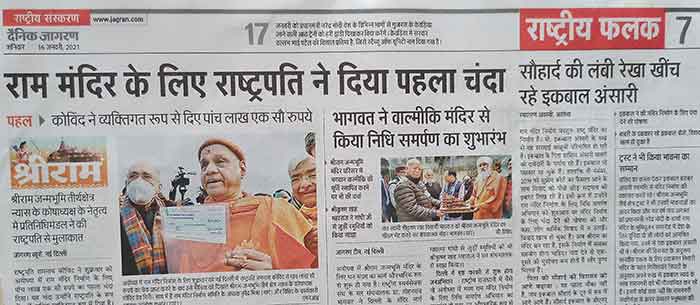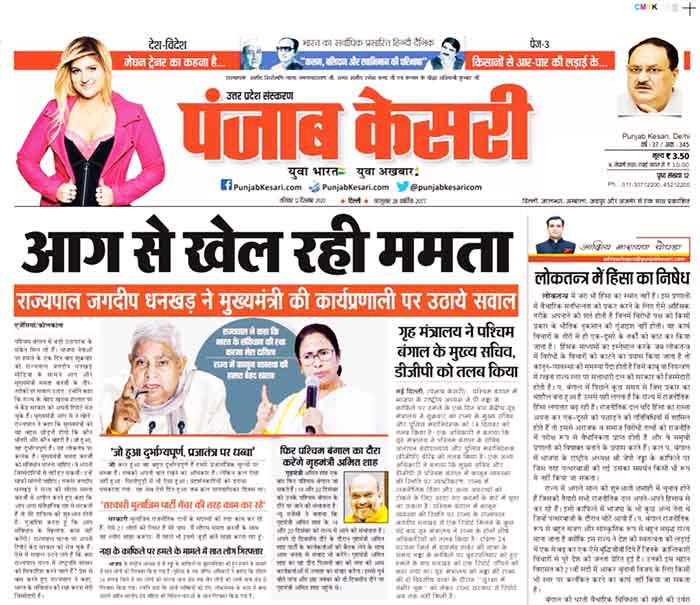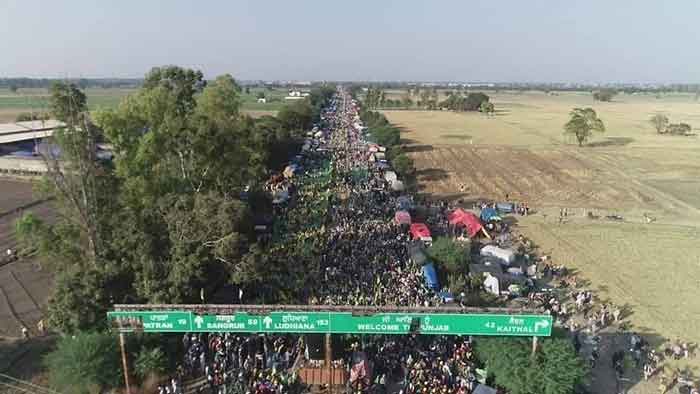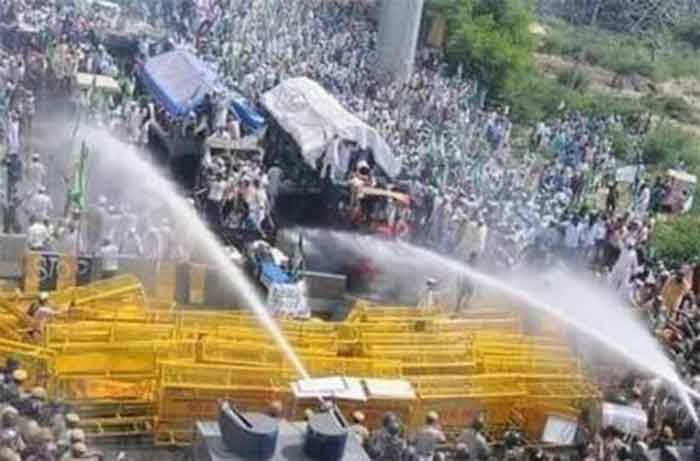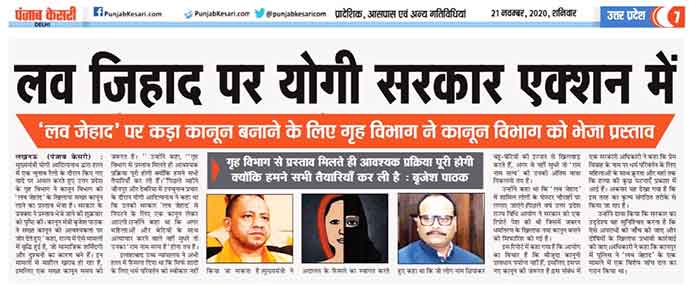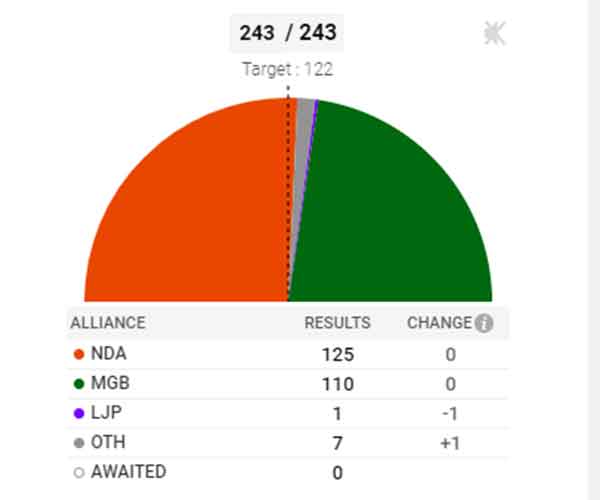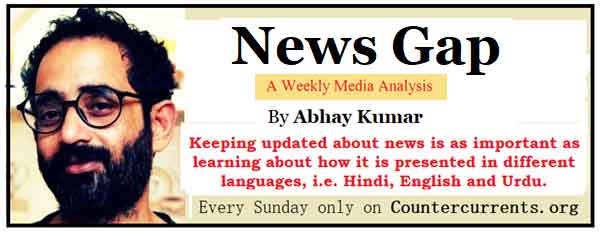
Do you know that the European Parliament Subcommittee on Human Rights has written a letter to Home Minister Amit Shah, expressing deep concern about the arrest of activists and intellectuals such as Gautam Navlakha and Anand Teltumbde?
Are you aware of the fact that Amnesty International (India) has demanded the release of 11 human rights activists who have been jailed in the Bhima-Koregaon case?
Has the news about 21 human rights organizations–from the USA, the UK, Canada, Japan, and India, seeking the release of Anand Teltumbde and 10 others in the Bhima-Koregaon case–brought to you?
Have your newspapers told you that that the National Human Rights Organization (NHRC) has issued a notice to governments and the Indian Railways, accusing them of violating the human rights of migrant workers?
If you are dependent on the mainstream media, the chances are less that these developments have been brought to you. In case your information is solely based on Hindi newspapers, you are likely to be kept ignorant about these serious issues.
It is a matter of grave concern that the media is less interested in reporting the human rights concern, while it is very enthusiastic to feed you stories in praise of the establishment. Moreover, it has developed a tendency to present the police version to be sacrosanct.
In other words, the media, particularly Hindi newspapers, has shown little concern about human rights, while they were at the forefront to demonize the accused arrested in connections with the recent Delhi riots and anti-CAA (Citizenship Amendment Acts) protests.
While they have given little or no space to the strong objections raised by the Human rights organizations, they have propagated the police charge sheets against several anti-CAA activists as the gospel truth.
Last week the media was busy with singing hymns in praise of Narendra Modi Government at the centre as it completed six years in power. The strong objections of the human rights organizations got lost in this din. The mainstream media kept offering ‘gifts’ to the establishment by publishing positive news. While one English daily published article of Home Minister Amit Shah, another invited the Prime Minister himself to praise his government.
However, the stories about human rights were recovered after the scrutiny of a few newspapers. For example, the Urdu daily Inquilab (Mumbai, 31 April) prominently published human rights objections by the European Union panel. Around that time Hindi newspapers were preoccupied with making news out of the letter to the nation by Prime Minister Modi. The Urdu daily published it as a lead story. It got coverage in a seven-column lead story on the first page. Look at its heading, “The European Parliament expressed its concern (izhar-e-tashvish) about the arrest of human rights (haquq-e-insani) activists (karkunan) and the imposition of terror (dahshat gardi) charges
The news summarizes that the Sub-Committee of the European Parliament has expressed deep concern over the incidents of the imposition of draconian laws like UAPA against human rights activists in India. It has also demanded the release of all political prisoners.
In her letter to Home Minister Amit Shah, Maria Arena, European Union Special Representative for Human Rights, said that it is a matter of great concern that the human rights activist in India is being harassed for speaking for the rights of the poor and underprivileged communities. Her letter to the Home Minister contends that “To date, the European Parliament has noticed that various forms of legitimate peaceful protests against laws, policies and governmental actions, including the Citizenship Amendment Act, have been portrayed as terrorist activities under this legislation, resulting in some arrests under this umbrella. This is notably the case for human rights activists such as Safoora Zargar, Gulfisha Fatima, Khalid Saifi, Meeran Haider, Shifa-Ur-Rehman, Dr Kafeel Khan; Asif Iqbal and Sharjeel Imam who were recently arrested by the Police”.
The organization has raised a lot of questions over the imposition of UAPA on people who oppose the citizenship-law and have been termed as “terrorist”. Finally, the European Human Rights Organization called for a stop against the people working for human rights. “Consequently, we strongly believe that measures should be urgently taken to stop impeding and criminalizing the work of human rights defenders by means of overly broad national security legislation and to respect their freedoms of association and expression. India should do much more to ensure a safe and conducive environment for civil society working in the country and consider enacting a law on the protection and promotion of human rights defenders”.
Meanwhile, the NHRC has issued a notice to the Indian Railways and the Government for the problems of poor labourers. The source of this news was also again Inquilab (Mumbai, 31 May, p. 13). The Urdu daily further writes that the NHRC has termed the railway administration’s attitude towards the workers as cruel.
The NHRC has sent a notice to the Chairman of the Railway Board, Central Home Secretary, Chief Secretaries of Bihar and Gujarat, asking them to send their reply within four weeks. They have also been asked what steps they have taken for the basic amenities of the passengers. Let me quote a passage from the NHRC notice dated May 28. “The National Human Rights Commission has taken suo motu cognizance media reports that the trains which are ferrying the migrant labourers are not only starting late but are taking many additional days to reach the destination. In one of the reports, it is alleged that many migrant labourers lost life during their journey by train due to longer duration and no arrangements for drinking water and food etc.”
On the plight of the migrant workers, eminent economist Prabhat Patnaik wrote an import opinion piece in Telegraph (Kolkata, June 5, 2020), expressing deep concern over the denial of rights to 14 crore migrant workers who have lost means of livelihood after the announcement of the lockdown by the Prime Minister on March 24. He opined that compensating the loss of the workers who lost their jobs is the duty of the government. As he put it, “When Narendra Modi announced a nationwide lockdown on March 24 because of the coronavirus crisis, that action took away by the stroke of a pen the incomes of innumerable workers, including an estimated 14 crore migrant workers, of whom about 10 crore were inter-state migrants. But there was no compensation announced, and till today no compensation has been either paid or is in the offing.”
While the human rights activists are being framed and jailed and workers are being denied their basic rights, mainstream media have focused on two issues. The first is the celebration of the completion of six years the Modi rule and the second is the demonization of the anti-CAA protestors.
For example, Dainik Jagran (National, May 31, 2020) carried a lead story about Modi. Look at its heading, “Corona will be won over, the disaster would not decide the future: Modi”. Pioneer (Hindi, Delhi, May 31, 2020) had a front-page story about Modi too. The headline ran, “PM Modi gives a message of assurance to the nation” (PM Modi ne desh ko diya bharoshe ka sandesh).
The newspapers were also preoccupied with reporting the police version as a piece of truth. Hindustan (Hindi, June 4, 2020, p. 5) blamed former Delhi AAP leader Tahir Hussain for killing the I.B. officer. However, Haribhoomi (Hindi, Delhi, June 4, 2020, p. 1) carried a page one story in which it accused Tablighi Jamaat and Deoband of Delhi riots. “Jamaat Members sparks (Delhi) fire”, ran a sub-heading. Dainik Jagran (June 4, 2020) has a story in which it blamed anti-CAA activist Safoora Zargar for giving inflammatory speeches.
Unfortunately, the media has never questioned those who have been the main force behind the Delhi riots. Even Facebook CEO Mark Zuckerberg has given a clear indication about who is responsible for them.
Explaining what amounted to instigating violence, he said, “And there have been cases in India, for example, where someone said, ‘Hey, if the police don’t take care of this, our supporters will get in there and clear the streets’.
Abhay Kumar is a Ph.D. from JNU. He is broadly interested in Minority and Social Justice. Earlier, he held a Post-Graduate Diploma in English Journalism from Indian Institute of Mass Communication, New Delhi and worked as a Delhi-based reporter with The Indian Express. You may write to him at [email protected]
SIGN UP FOR COUNTERCURRENTS DAILY NEWS LETTER

